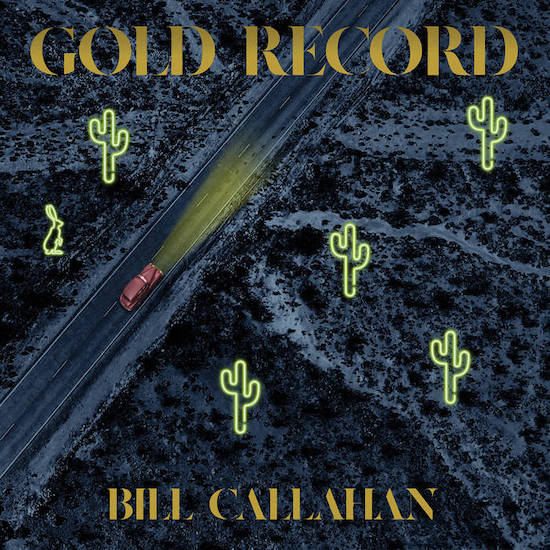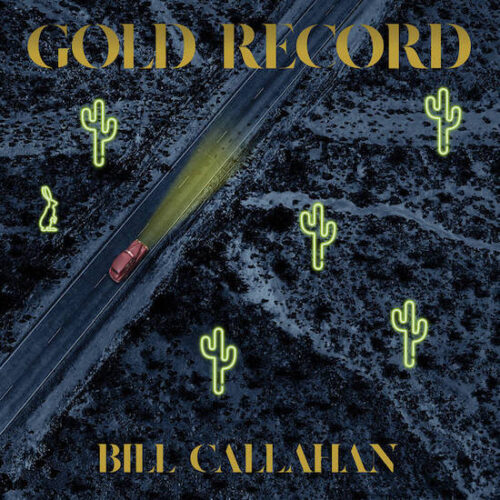Preoccupied with the imponderabilia of day to day living and keen to give breathing space to domestic minutiae and small talk, Bill Callahan’s Gold Record is generous with its simplicity and hope, and ambitious in its self-assuredness. Callahan’s vocals are closer and more intimate than ever, taking on a homeward bound languor that is quite a turn-on and is unmistakably himself. His trademark omniscient narration stretches across the acoustic album, which is told with a dash of Ennio Morricone, a quarter ounce each of John Barry and Harry Nilsson, and topped with Bill Fay and La Monte Young. Gold Record is a bit ‘cowboy boots on a Wassily chair’, which is to say that it is as fond of beautiful design and polished steel as it is of putting its feet-up; all worn and slung leather.
Something spectacular about this album is the ease with which Callahan steps into a postmodern mode of narration, assuming different identities and inhabiting different bodies in order to uncover some kind of universal shared wisdom. Just as Kathy Acker played with plagiarism and pastiche by rewriting Cervantes’ Don Quixote, substituting each pronoun for ‘I’ in order to take a stab at self-definition, Callahan, with a little satire, inhabits the voices of others to maximise impact and set the scene (for example, the frank opening line “Hello, I’m Johnny Cash” really cements the tone of the album). Callahan moves deliberately, paying homage to central influences such as Ry Cooder whilst they are still around to feel it, prompting the question: why is it that we wait until it’s time for obituaries to confess our love? ‘Ry Cooder’ is the model love-letter for the meta age, told with humor and generosity – “English rockers all their money goes right up their nose. While Ry just smiles and tries another difficult yoga pose”.
Yet Callahan also reappropriates himself by revisiting his 1999 tune ‘Let’s move to the country’. In its first incarnation, sung under Callahan’s ‘Smog’ moniker, there are lines left trailing and unfinished – “let’s start a…”, “let’s have a…”. But now, on Gold Record, the lines are completed: “let’s start a family”, “let’s have a baby… or two”. There is a palpable sense of having come full circle that is reflected across the whole album. Without too much sentimentality or the restrictions of an outlook which is solely retrospective, there remains a definite sense of comfort and of having made peace throughout Gold Album. Just like standing on a trig point and looking back through cloud, or running into the sea, or waving at a passing train. The atmosphere is hot, low, and close, but the vista is broad. The tone is both trusting and luring, and the album opens itself up to be listened to in a multitude of ways.
Matt Kinsey (guitar)’s contribution to Gold Record is steadfast and sensitive, carrying the acoustic record from horizon to horizon, mapping a territory peppered with candid dialogue and ornamentation by way of horns and drums. It makes sense to think of Callahan and Kinsey’s guitars as being in dialogue with one another. The opening track ‘Pigeons’ opens with a character questioning his plenipotentiary tendency to give advice to a pair of newlyweds that he picks up the road, noting, “when you’re dating you only see each other, and the rest of us can go to hell. But when you’re married, you’re married to the whole wide world”. Gold Record shows Callahan toying with his own advice in theory and in practice. The gentle impartiality throughout Gold Record seems to speak (thematically and sonically) to the idea that “when you’re married, you’re married to the whole wide word” in a way that alludes not to loss of intimacy or public oversharing, but positivity. Being “married to the whole world” takes on the colour of accountability, and the initiative to initiate wider conversations, relating the private and personal to the wider world in order to make life not messier but simpler.
Callahan’s manner moves between inquisitive and interrogative. ‘Protest Song’ broaches the subject of empty sentiments in popular music and prime-time telly, taking on a meta quality as the protest song protests protest songs. But this head-on rebuttal of mass media-driven fobbing-off is full of poetry and self-awareness. Callahan is never too much of a Smart Alec to spell it out literally: “I protest his protest song. I protest his protest song. I’d vote for Satan. If he said it was wrong”. Like an all-American Jake Thackray, or the Southeastern Stateside component of the Angry Young Men of 1950s provincial Britain, Callahan’s antagonistic disposition is confined to the sweet spot, and combined with an earnest eagerness to unpack language.
‘The Mackenzies’ is a perfect example of suburban kitchen sink drama. The song tracks an encounter between the neighbour who lives across the street and the main character, “the kind of guy who sees a neighbour outside and stays inside and hides,” thinking “I’ll run that errand another time”, whose car breaks down in front of his house, and is invited in to the said neighbours’ house. Callahan’s natural grasp of the great tropes of masculinity (“look at the time, it’s almost Beer Thirty”) explores the bleary eyed dynamics of father-son relationships and male friendships, as well as the notion of taking the uncomfortable plunge to make kin with the unknown amidst the freakishness of suburbia.
Callahan’s engrossment with the fantasy lives of others comes across through a narrative of smart quips that always keep a strange distance. Each tale is hazy and absurd in the Miranda July sense, meaning that the absurdity is born out of the quotidien. The mise-en-scène seems so familiar, re-trodden and heavily thumbed that it becomes the epicentre of eccentricity and a site for second-guessing. Yet for all Gold Record’s concern with masculinity and domesticity, the narrative never quite succumbs to the sleaze of sticky lino floors, as Gold Record retains a plush and gentle earnestness. In character, it is akin to a Levi-jeans orthopraxy of habitual ritual and everyday life: familiar, culturally significant, and worn-in with meaning.
The standalone quality of each track is confirmed by the way in which the album was released: as a series of singles, one of the time let out gently into the world, over the past two months. Taking slow pleasure in the idleness and moments of magic, each track was held steady in the hand and given some time to gage the water and catch its breath before being released downstream.
At first glance, Gold Record stretches into the late-night landscape with anecdotal tales of masculinity and lonesome rumination fit for the compulsively peripatetic. But sit with it for a minute, and you’ll find that it proffers the warmth, prudence, and tenderness captured only by someone who feels truly at ease, relaxing into domesticity, and finding both comfort and solace. For an album that is extremely paired down, it is complete in all its meditative richness and erudite honey light. Gold Record presents itself as an album of quiet epiphanies – reaching into the interior space of the quotidien and feeling around for something that is tempting to romanticise, but instead, producing it before an audience with a frankness that trumps a flourish.



